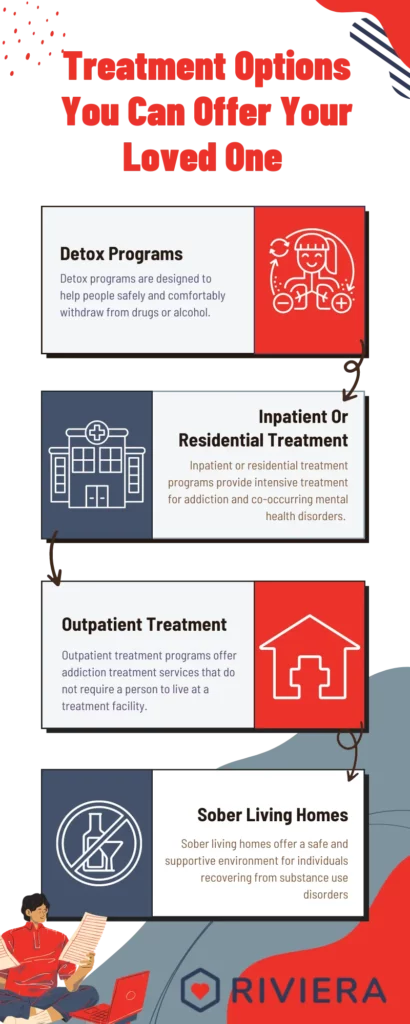Watching a loved one or family member struggle with addiction can be heartbreaking and overwhelming. You want to help them get sober but may not know where to start.
According to the National Survey on Drug Use and Health (NSDUH) in the United States, in 2019, an estimated 20.4 million people aged 12 or older had a substance use disorder in the past year, but only 4.2 million received substance use treatment in the past year.
In this article, we’ll explore the signs that your loved one may have a problem with addiction, the first step to helping them get sober, the benefits of sobriety, and how you can support your loved one during their sobriety.
Is It Your Responsibility To Help A Loved One Get Sober?
Love can motivate us to do extraordinary things for the people we care about. If you are a close family member, concerned significant other, or friend concerned about your loved one’s well-being, you may feel a sense of responsibility to help them in any way you can.
Addiction can be complicated and rooted in trauma, attachment styles, and mental health disorders, and it requires professional help and ongoing support to achieve and maintain sobriety. You cannot force someone to into sobriety, and it’s their ultimate decision to seek help and change their behavior.
However, you can offer support, encouragement, and resources to help them make positive changes in their life. By helping a loved one get sober through support and encouragement, we show we care and want to help them regain control over their lives and rebuild their relationships with others.

How To Tell Your Loved One Needs Help
There are a number of signs that may indicate someone is struggling with drug abuse or alcohol addiction. Some signs may be physical, while others may be behavioral or psychological.
Physical signs:
- Bloodshot eyes
- Changes in appetite or sleep patterns
- Unusual smells on breath or clothing
- Unexplained bruises or marks on the skin
Behavioral and psychological signs:
- Mood swings
- Changes in social activities or hobbies
- Secretive behavior
- Changes in performance at work or school
Other signs:
- Financial problems
- Legal issues
- Relationship problems
What’s The First Step To Help Them?
The first step to help a loved one get sober is to have an honest and open conversation with them about your concerns. This conversation should be approached with compassion and empathy rather than judgment or criticism. It’s important to listen to their perspective and avoid getting defensive or argumentative.
Addiction and recovery is a journey that requires patience, understanding, and ongoing support. The most important thing is to be there for your loved one and let them know they are not alone in their struggle.
Express your love and support for them, and let them know that you are there to help them in any way you can. Offer to help them find resources such as support groups or addiction treatment programs and encourage them to seek professional help, even providing them with local rehab centers and support groups.

Treatment Options You Can Offer
- Detox Programs: Detox programs are designed to help people safely and comfortably withdraw from drugs or alcohol. These programs can be medically supervised and often provide medications to manage withdrawal symptoms. Detox is usually the first step in addiction treatment, and it is crucial to ensure a safe and successful recovery.
- Inpatient or Residential Treatment: Inpatient or residential treatment programs provide intensive treatment for addiction and co-occurring mental health disorders. These programs require individuals to live at a treatment facility for a specified period, usually 30-90 days and offer a variety of evidence-based therapies and support programs to help individuals achieve and maintain sobriety.
- Outpatient Treatment: Outpatient treatment programs offer addiction treatment services that do not require a person to live at a treatment facility. Instead, individuals attend counseling, therapy, and support groups on a scheduled basis, usually several times per week. Outpatient treatment is a more flexible option for people who cannot commit to an inpatient program but still need structured support.
- Sober Living Homes: Sober living homes offer a safe and supportive environment for individuals recovering from substance use disorders. These homes offer a drug- and alcohol-free living environment, often with structured schedules and routines that can help individuals maintain sobriety. In addition to a sober living environment, residents are typically required to participate in counseling, 12-step meetings, and other support programs.

Checking A Loved One Into An Addiction Treatment Center
While it may be necessary to intervene if your loved one’s substance use disorder puts them or others in danger or they cannot function in their daily life due to their addiction, it’s important to remember that many addiction treatment centers are voluntary. In some cases, individuals may be required to attend treatment as part of a court order or as a condition of parole or probation.
The National Institute on Drug Abuse reports that voluntary participation in addiction treatment programs can lead to improved outcomes and a higher likelihood of sustained recovery. When individuals feel supported and empowered, they are more likely to engage fully in the treatment process. On the other hand, compelling or coercing someone into attending a treatment center can leave them feeling unsupported and controlled, which may not be helpful for their recovery.
How To Support Your Loved One’s Sobriety
Helping someone recover from a substance abuse disorder can seem like a challenging task, but there are things you can do to help them feel supported in their mission to live sober:
Remember, addiction is a disease.
Drug and alcohol abuse can rewire the brain and lead to dependency, causing a distorted value system that supports ongoing substance use. It’s natural to feel frustrated when a loved one harms their health, but it’s important to avoid making them feel like an outcast, which can lead to shame and make them less likely to seek help. Limiting contact may be necessary for your own well-being, but after they enter recovery, try to understand how substance misuse became a part of their life and ask how to best support them.
Be open-minded and optimistic.
As your loved one works through negative emotions and impulses, it is essential to be a positive influence in their lives. You can remind them that every step toward recovery is progress and encourage them to keep moving forward.

Don’t dwell on the past.
As your loved one strives to live sober and happy lives, it is important for those who surround and support them to stay present and grounded in the moment. Avoid dwelling on past negative experiences or using hurtful language, such as referring to someone as “an alcoholic” or “an addict.” Instead, channel your energy into being there for yourself and your loved one.
Remove any temptations or substances.
For someone struggling with drug or alcohol addiction, seeing an empty bottle or pill bottle can trigger a relapse. In the early stages of recovery, it is crucial to remove all reminders of the substance and enforce a strict abstinence policy for the entire family. This shows your loved ones that you are committed to their well-being. As the recovery journey continues, encourage your loved ones to take responsibility for their sobriety, even when substances are available.
Don’t smother them.
To support your loved ones in their recovery, it is important to balance monitoring their progress and respecting their independence. Establish clear boundaries to avoid overstepping and undermining their sense of autonomy. If you overwhelm them, they might become codependent on you and rely on your consistent support. Then, when you’re unavailable to help or encourage them, they may feel hopeless and resort to an addiction.
While being close to someone struggling with addiction can be challenging, avoid using damaging language or ultimatums like “If you loved me, you’d quit.” Instead, express your concerns and support by asking how you can help their recovery. Remind them frequently that they are valued, capable, and not alone in their journey to sobriety.
Encourage healthy habits and new hobbies.
Encourage healthy habits like eating well, sleeping enough, and exercising regularly. Spending time in nature can also promote mental health and reduce stress. While providing emotional and material support is helpful for those in early recovery, it’s important to avoid enabling substance abuse. Focus on supporting your loved one’s recovery efforts and future goals, such as education or employment. Encouraging new hobbies like journaling, crafting, or other creative activities can also provide a healthy outlet for their interests.
Most importantly, don’t forget about yourself.
Self-care is essential when supporting someone with substance use disorder, as it can affect the caregiver’s physical, emotional, and mental health. It’s easy to put the needs of your loved one before your own, but neglecting self-care can lead to illness, depression, and anxiety. Remember, you cannot pour from an empty cup. Seek support groups for families to provide care and community as you navigate this challenging role.
Contact Riviera Recovery
If you or a loved one could benefit from addiction treatment or a sober living environment, contact Riviera Recovery. If your loved one hasn’t gone through a detox or treatment program, we can help find a center that works for them with one of our many partnered programs. Once they leave their initial treatment program, we can help them transition into daily life through the support and comfort of one of our sober living homes in Los Angeles.


